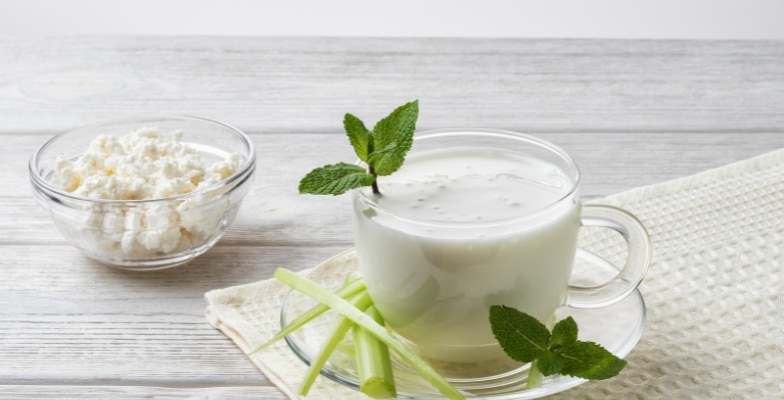How Much Protein Should I Eat Per Day?
- What Are Protein And Its Functions
- Complete, Incomplete & Complementary Proteins
- How Much Protein Per Day
- Is Extra Protein Bad For The Kidney?

What Are Protein And Its Functions
Proteins are the building blocks of body tissue. They are essential nutrients and can also serve as an alternate source of fuel when needed. Your body uses protein for growth and maintenance.
Proteins also function as enzymes in membranes and as transport carriers and hormones; their components serve as precursors for nucleic acids, hormones, vitamins, and other integral molecules.
1g of protein contains 4 calories, and you can stock up on proteins from animal sources like meats, dairy products, fish, and eggs and vegan sources like whole grains, pulses, legumes, and nuts. Proteins are made up of amino acids, which are like building blocks.
Related Articles:
7 Functions Of Protein In The Body
Complete, Incomplete & Complementary Proteins
What Do We Mean By Complete, Incomplete And Complementary Proteins?
Twenty different amino acids join together in various combinations to make all types of proteins. Our bodies can’t make some of these amino acids. Hence, they are essential amino acids because our diet must provide them.
In terms of diet, protein sources are categorized according to how many of the essential amino acids they provide.
Complete Protein
They provide all of the essential amino acids. Complete proteins are also referred to as high-quality proteins. Animal-based food sources such as meat, poultry, fish, milk, eggs, and cheese are complete protein sources.
Incomplete Protein
They are low in one or more of the essential amino acids. Plant-based food sources such as grains, lentils, and rice are incomplete proteins.
Complementary Protein
These are two or more incomplete protein sources that together provide adequate amounts of all essential amino acids. For example, rice contains low amounts of the amino acid lysine and high amounts of the amino acid methionine; however, dry beans contain higher amounts of lysine and lesser amounts of methionine.
Together, these two food sources can provide adequate amounts of all the essential amino acids required by the human body.
How Much Protein Per Day
How Much Protein Per Day For Sedentary Individuals
The main factors that determine how much protein an individual needs are training regime and habitual nutrient intake. At the same time, current literature suggests that it may be too simplistic to rely on current recommendations for daily protein intake.
Various factors need to be considered, such as the quality of proteins according to the biological value of the source, caloric intake, exercise intensity, duration and type of exercise, training history, gender, age, etc.
Currently, the RDA, which stands for Recommended Daily Allowance (average daily level of intake sufficient to meet the nutrient requirements of nearly all (97-98%) healthy people), for protein intake, is 0.8 g/kg of body weight.
But please note, this intake is fine for people who live a sedentary lifestyle and represents an intake level necessary to replace losses and avert deficiency. In simple words, to prevent malnutrition. 1https://www.nap.edu/read/10490/chapter/12 However, this recommended intake is not enough for active people who indulge in exercise.
How Much Protein Per Day For Active Individuals
Numerous studies indicate protein requirements for active individuals are approximately double that of the RDA, at least 1.2-2.0 g/kg of body weight. 2https://www.ncbi.nlm.nih.gov/pubmed/26891166, 3https://www.ncbi.nlm.nih.gov/pubmed/20048505 This range is recommended by,
-The Academy of Nutrition and Dietetics
-The American College of Sports Medicine
-The International Society of Sports Nutrition also recommends a very similar range of (1.4-2g/kg). 4https://www.ncbi.nlm.nih.gov/pubmed/28642676
Here’s an example to illustrate this clearly, suppose an individual weighs about 70 kg (154 lbs), and his energy intake averages around 2,000 calories/day. In that case, his protein requirement depends upon his choice of activity (intensity, duration, and type) and is one of the following:
Individuals engaging in endurance exercise should ingest levels at the lower end of this range, or 1.4 g/kg/day. In this case, the person should consume about 70 (bodyweight in kilos) x 1.4 (g of protein) = 98 g of protein/day.
Individuals engaging in intermittent activities, such as football, rugby, etc., should ingest levels in the middle of this range, or 1.7 g/kg/day. In this case, the person should consume about 70 (bodyweight in kilos) x 1.7 (g of protein) = 119 g of protein/day.
People engaging in strength/power exercises, such as heavyweight training, should ingest levels at the upper end of this range, or 2 grams/kg/day. In this case, the person should consume about 70 (bodyweight in kilos) x 2 (g of protein) = 140 g of protein/day.
How Much Protein Per Day | Maximum Intake
Based on numerous studies and research, one can conclude that for active individuals partaking in physical activities ranging from sports to weight training, the optimal protein range is between 1.2 to 2g/kg.
So the question that demands attention here is this: Is there any additional benefit of ingesting more than 2g/kg of body weight of protein per day? The additional benefit could be either more muscle gain or superior fat loss.
The top guns performed a systematic review, meta-analysis, and meta-regression in this industry, like Alan Aragon, Menno Henselmans, Brad Schoenfeld et al. 5https://www.ncbi.nlm.nih.gov/pubmed/28698222
And they concluded that protein intake at amounts higher than ~1.6g/kg/day does not further contribute to RET (Resistance exercise training)-induced gains in FFM (fat-free mass).
A 2006 study by Hoffman et al. concluded that protein intake above 2g/kg/day did not produce any significant strength or lean mass gains. 6https://www.ncbi.nlm.nih.gov/pmc/articles/PMC2129168
So if you are a 70kg individual, you don’t need more than 112g (70*1.6) daily protein for maximal muscle gains. More protein, however, will not result in extra muscle gains! Protein intake above 2 grams/kg/day is only advised in special cases, such as very high energy intake.
In the above example, if an individual is an athlete and has a caloric requirement of 4,000 calories, then calculating his protein requirement at a modest level of only 12-15 % of the total calories gives us about 150g (15 % of 4,000 calories = 600/4 = 150g), which is 2.14g/kg/day.
However, these cases are sporadic, and the lower amounts described above should be sufficient for most recreational athletes.
Is Extra Protein Bad For The Kidney?
You might wonder if consuming 1.2-2 of protein/ kg of body weight will harm your kidneys. The long-term effects of high protein intake on chronic kidney disease are still poorly understood, and there isn’t significant evidence to link a high protein diet with kidney issues. 7https://pubmed.ncbi.nlm.nih.gov/16174292/, 8https://pubmed.ncbi.nlm.nih.gov/17369718/
A study compared normal healthy adults following a regular, unrestricted protein diet with a group of vegetarians who maintained a long-term low-protein diet. The results suggest that a high protein non-vegetarian diet does not significantly affect how the kidney functions with regard to ‘normal aging’ in healthy subjects.
However, consult your physician before you embark on a high-protein diet if you have renal issues.

Skill-Based Education.
Global Recognition.
Powerful Community Building
Secure a certificate of completion in as little as a day by graduating from one of our free courses.
Get Access to Our Free Courses. No Credit Card Required.

Fabulous Body Membership
Your All-Access Pass to A Fabulous Body & A Rewarding Career
25+ Certificate Courses & Programs, All Included
15 Day Free Trial, 100% Money-Back Guarantee
About Akash Sehrawat
Akash is a creator of 25+ programs and certificate courses in which more than 200,000 students have enrolled both on Udemy and Fabulous Body's native platform. Akash is also an author of three books that can be found on Amazon. His answers on Quora have gathered more than 12 million views in less than a year.











Hi Akash. I have Kidney stone tendancy and I think it is really coming between me having high proteins. What should I do?
Hey Aniket, Sorry for the delayed response buddy! Aim to achieve the lower end of the range i.e. 1-1.2g/KG of BW and you should be fine. Good luck and let me know if you want to know anything else.
How about whey? I asked my doc if I can have whey he immediately said No as it MAY cause me trouble. I am going for white eggs and beans for now.
Whey is not a problem. Its simply derived from milk. However, there are thousands of brands out there, and only a selective few are using quality ingredients, superior processing methods, and approved sweeteners, you can find about the criteria for selecting the right whey here: https://fabulousbody.com/choosing-the-right-whey-protein-supplement-critical-points-to-remember/
If you can comfortably reach the required protein range with food alone, then whey will not make much of a difference in your results, however, if you find it difficult to reach your goals, supplementing it with ~20gms Whey should not be an issue.
In the end, this is just my opinion based on my experience and knowledge and one should always take their doc advise. Hope this helps:)
Thank you so much Aakash. That was a real boost.
Happy to help. Let me know how it goes…
Hi Akash!I am doing strength training and cardio to lose weight.Should i lift heavy to burn fat or do more reps with lighter weights to burn fat.
Hey Anvesh,
Thank you for your comment and apologies for the late reply!
I strongly recommend to stick with heavy weights. With that you won’t lose your muscle ( there is a direct co-relation between your strength and your muscle mass) and also the EPOC will be higher…meaning higher intensity of your workouts will keep your metabolism high for long hours, sometimes up to 48 hours (acc to few studies). all this extra energy will be supplemented by your fat reserves. i have tried both approaches and one with heavy weight is the best. hope this helps:)
Hello sir , my name is saurabh . I am very thankful for ur protein intake plan but I had a que that I am gyming from a year but not able to bulk in a proper way……my weight is bet 62-64
que-
1.eating of 4 full eggs daily is gud or not n if yes then will it cause over heat in body i.e acne or some other problems.
2.what should I add in my diet to bulk up rapidly without any protein powder…..
Hey Saurabh,
To gain weight you need to eat above your TDEE. You can figure this out here: https://fabulousbody.com/free-tdee-calculator-%E2%80%8B-how-to-calculate-tdee
The maximum I would suggest is 3 whole eggs. You can add 2 egg whites to the mix!
This is a good resource if you are trying to build muscles/gain weight: https://fabulousbody.com/how-to-build-muscles-the-ultimate-guide/
Hope this helps!
Shivani
4 April 2020 At 4pm
Hi Aakash sir I m 50yrs old dibetic patient. I m lecturer by profession. plz advice me my diet plan .
Hello Shivani. I am not a doctor and cannot advise people who have a medical issue. However, I can offer a few tips:
-Limit your carbs, keep it in the moderate range ideally close to 100-125g. Limit fruits and avoid any high glycemic fruits like bananas, melons etc. Keep proteins and fat moderate. Eat very close to how much your body can burn. Use this TDEE calculator: https://fabulousbody.com/free-tdee-calculator-%E2%80%8B-how-to-calculate-tdee. And eat 20% less then TDEE.
Hope this helps.
Hi Akash, How the protein breaks down in our body?
This is an advanced topic, Pardeep, I’ll cover it in my Holistic Nutrition coach course which will be out in a few months time!
Thanks Slash Sir, It is great information for me,
Dead written content, thankyou for information .
Hi Zoritoler,
Thank you for your kind words.
Regards,
Kunal